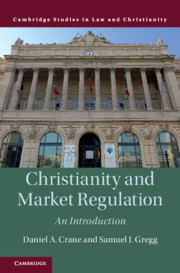Book contents
- Christianity and Market Regulation
- Law and Christianity
- Christianity and Market Regulation
- Copyright page
- Contents
- Contributors
- Acknowledgments
- Introduction
- 1 Christianity and the Morality of the Market
- 2 The Common Good and the Role of Government in Regulating Markets
- 3 Public Choice Theory and Interest Group Capture
- 4 Christianity and Antitrust
- 5 Christianity and Corporate Purpose
- 6 Is Entrepreneurship Christian?
- 7 Subsidiarity and the Role of Regulation in the Financial Sector
- 8 Christianity and Bankruptcy
- 9 Patents, Access to Health Technologies, and Christianity
- 10 Price Controls and Market Economies
- Index
10 - Price Controls and Market Economies
Published online by Cambridge University Press: 18 June 2021
- Christianity and Market Regulation
- Law and Christianity
- Christianity and Market Regulation
- Copyright page
- Contents
- Contributors
- Acknowledgments
- Introduction
- 1 Christianity and the Morality of the Market
- 2 The Common Good and the Role of Government in Regulating Markets
- 3 Public Choice Theory and Interest Group Capture
- 4 Christianity and Antitrust
- 5 Christianity and Corporate Purpose
- 6 Is Entrepreneurship Christian?
- 7 Subsidiarity and the Role of Regulation in the Financial Sector
- 8 Christianity and Bankruptcy
- 9 Patents, Access to Health Technologies, and Christianity
- 10 Price Controls and Market Economies
- Index
Summary
Governments usually adopt price controls to impose restrictions on the price of goods and services by employing the appealing argument that they are protecting the groups who find it difficult to meet increasing prices. Since ancient times, regulators have set maximum or minimum prices – price ceilings or price floors. A maximum price for bread was understood as a means to protect the poorest from starvation and the maximum price for house rents to protect them from becoming homeless. The minimum wage – the price floor for labor – was seen as a guarantee to prevent unskilled workers from falling below a minimum living standard.
- Type
- Chapter
- Information
- Christianity and Market RegulationAn Introduction, pp. 213 - 232Publisher: Cambridge University PressPrint publication year: 2021

